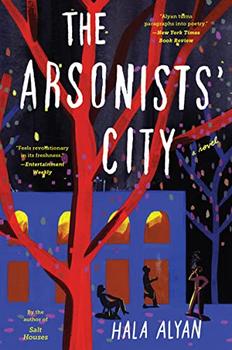Summary | Excerpt | Reviews | Beyond the Book | Readalikes | Genres & Themes | Author Bio

The Wrong Ghosts
Tonight the man will die. In some ways, the city already seems resigned to it, the Beirut dusk uncharacteristically flat, cloudy, a peculiar staleness rippling through the trees like wind. It's easy to costume the earth for grief, and tonight the birds perched upon the tangled electricity wires look like mourners in their black and white feathers, staring down at the concrete refugee camps without song.
There are orange trees in the courtyard, planted by the children the previous year; the NGO workers had wanted something bright and encouraged the youngest children to tie cheap ribbons to the branches, but they'd forgotten about the muddy season, and now the ribbons flap limply, streaked in dirt.
The man himself—Zakaria—knows it, or doesn't. He notices the queer feeling of the camps, the way his mother's makloubeh tastes perfectly fine but seems to be saltless, the meat stringier than usual. His sisters are gathered in the living room, cross-legged on the carpet, his mother's mother's carpet, the one that earned them a cuff on the ear back when they were children if they dropped crumbs or spilled Coke on it. You think my mama, Allah rest her soul, Allah take her and Allah keep her, hauled this on her back, her back, all the way from Jerusalem to Ramallah to Amman to this godforsaken armpit of the world so that her heathen grandchildren could spill soda on it? His mother hates the camps, hates Beirut, all of Lebanon, hates their neighbors, the aunties with their tattling and boring lives, always reminding her children, We used to have gardens in Palestine, trees that belonged to us.
His sisters are watching an Egyptian soap opera, one of their favorites, the one where the ingénue is kept from her love interest by his wicked mother. The screen is cracked from where one of his sisters—they always disagree about which one—threw a curling iron at it years ago, and it slices the starlet's torso in two as she cries on a park bench.
"What's wrong with you today?" Zakaria's mother asks him.
"Nothing," he lies. "I'm just not hungry." The truth is he's distracted. Something is nagging at him as it does when he forgets a song, the wispiest tune tugging at him. He thinks of the house across the city, the one where his mother has worked as a housekeeper for twenty years, the one he spent countless afternoons playing in as a boy with the son of the owner, the courtyard they'd transform into a battlefield, an ocean of sharks, lava. Idris was his first friend, his closest friend.
Whenever Zakaria thinks of the house, he sees it at dawn, the hour his mother would arrive for her daily duties after taking two buses from the south and walking from the final bus stop through the West Beirut streets, ignoring the vendors selling cigarettes and that sweet candy that made his teethe ache, to reach the gate, always latched, always easily unlocked.
He loved playing with Idris, of course, but he also loved those first couple of hours when the house was still quiet with the sleeping family, when his mother would fill buckets with warm soapy water to toss across the veranda, take down clothes she'd hung to dry in the garden the day before, whispering to him, "Silent as a mouse." When he was alone in the courtyard, it became his; he was the ruler of this inexplicable, beautiful place, a house with four bedrooms, bathtub faucets the shape of swans' necks.
Tonight he feels the house beckoning him with an invisible hand, feels greedy for those rooms, the silk-soft sheets that he'd slept in many times. But his best friend isn't speaking to him, their recent fight still raw as a burn, the insults they'd hurled at each other still echoing, each saying and not-saying the truth.
"You know what you did," Idris had finally said. "I trusted you. I've always trusted you."
Excerpted from The Arsonists' City by Hala Alyan. Copyright © 2021 by Hala Alyan. Excerpted by permission of Houghton Mifflin Harcourt. All rights reserved. No part of this excerpt may be reproduced or reprinted without permission in writing from the publisher.
Dictators ride to and fro on tigers from which they dare not dismount. And the tigers are getting hungry.
Click Here to find out who said this, as well as discovering other famous literary quotes!
Your guide toexceptional books
BookBrowse seeks out and recommends the best in contemporary fiction and nonfiction—books that not only engage and entertain but also deepen our understanding of ourselves and the world around us.